Are you looking for a natural and easy way to fertilize the pothos plants in your home? Most people would never consider using coffee grounds to nourish their plants, but it could be the perfect solution! In this article, we will explore the question, “Do pothos like coffee grounds?”
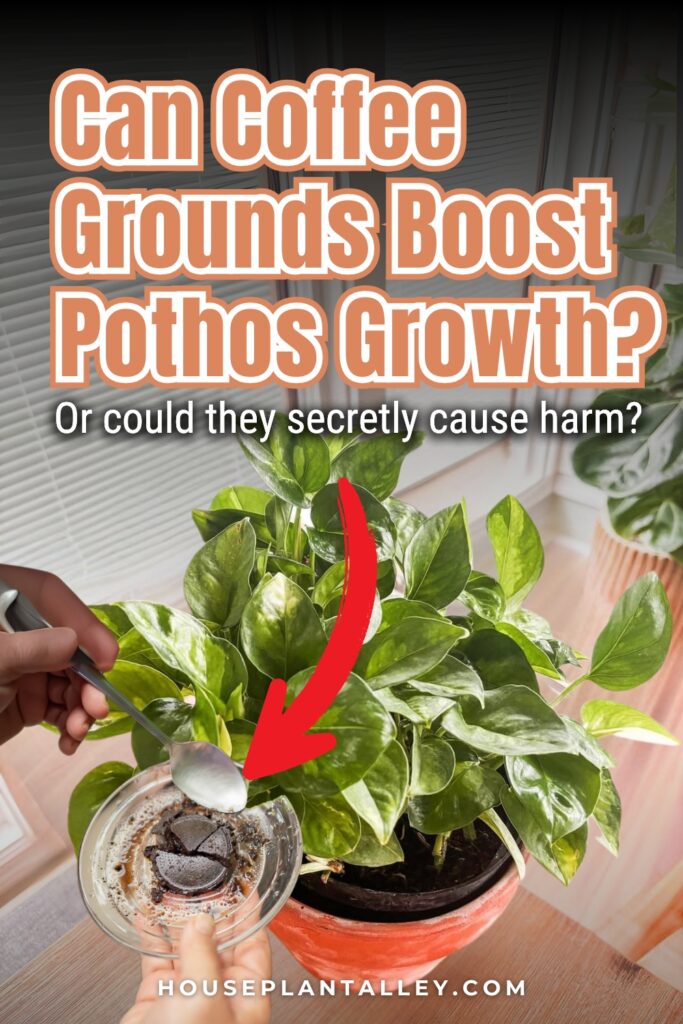
Contents
- 1 Do Pothos Like Coffee Grounds?
- 2 Benefits Of Adding Coffee Grounds To Pothos Soil
- 3 How To Incorporate Coffee Grounds Into Pothos Soil
- 4 Potential Risks Of Adding Coffee Grounds To Pothos Soil
- 5 Different Types Of Coffee Grounds To Use For Pothos
- 6 Maintenance Tips For Pothos Soil With Coffee Grounds
- 7 Recommended Amount Of Coffee Grounds For Pothos Soil
- 8 How Often To Add Coffee Grounds To Pothos Soil?
- 9 Conclusion
Do Pothos Like Coffee Grounds?
Many people are surprised to learn that coffee grounds can make a great fertilizer for pothos plants. Coffee grounds can provide a low-cost, easy-to-find fertilizer that is perfect for pothos plants. We will look at the benefits of using coffee grounds as fertilizer and how to do it correctly.
Benefits Of Adding Coffee Grounds To Pothos Soil
Adding coffee grounds to pothos soil can be beneficial in several different ways. Coffee grounds are an excellent source of nitrogen, a vital nutrient for plants, and they can also act as a natural fertilizer. Coffee grounds are a great way to add organic matter to the soil and help improve its structure, aeration, and water retention.
Coffee grounds can also provide beneficial microorganisms to pothos soil. These microorganisms help break down the organic matter and release nutrients that can be taken up by the plants. This can help improve the health of the pothos plants, as well as the overall soil quality.
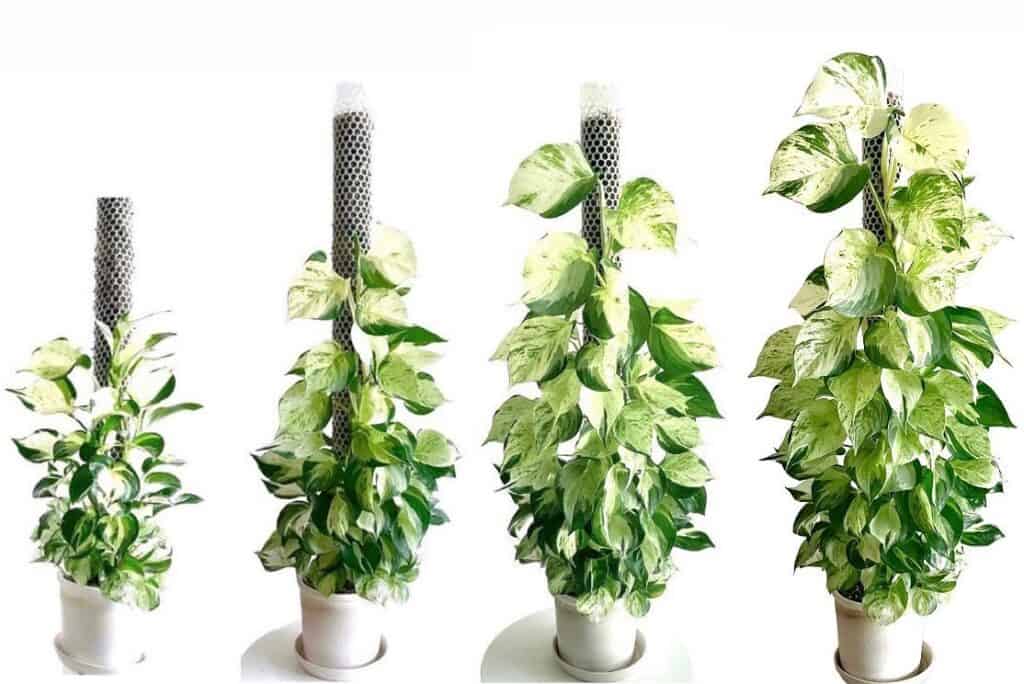
In addition, coffee grounds can help increase soil acidity. Pothos plants prefer slightly acidic soil, and coffee grounds can help bring the soil pH to the optimal range for pothos plants. Coffee grounds can also help buffer against sudden shifts in soil pH, which can be damaging to the health of the plants.
Finally, coffee grounds can act as a natural pest repellent. The grounds contain compounds that can repel some common garden pests, such as slugs and snails. This can help keep the pothos plants healthy and free from pest damage.
Overall, adding coffee grounds to pothos soil can be beneficial in many ways. It can provide essential nutrients, improve soil quality, and act as a natural pest repellent.
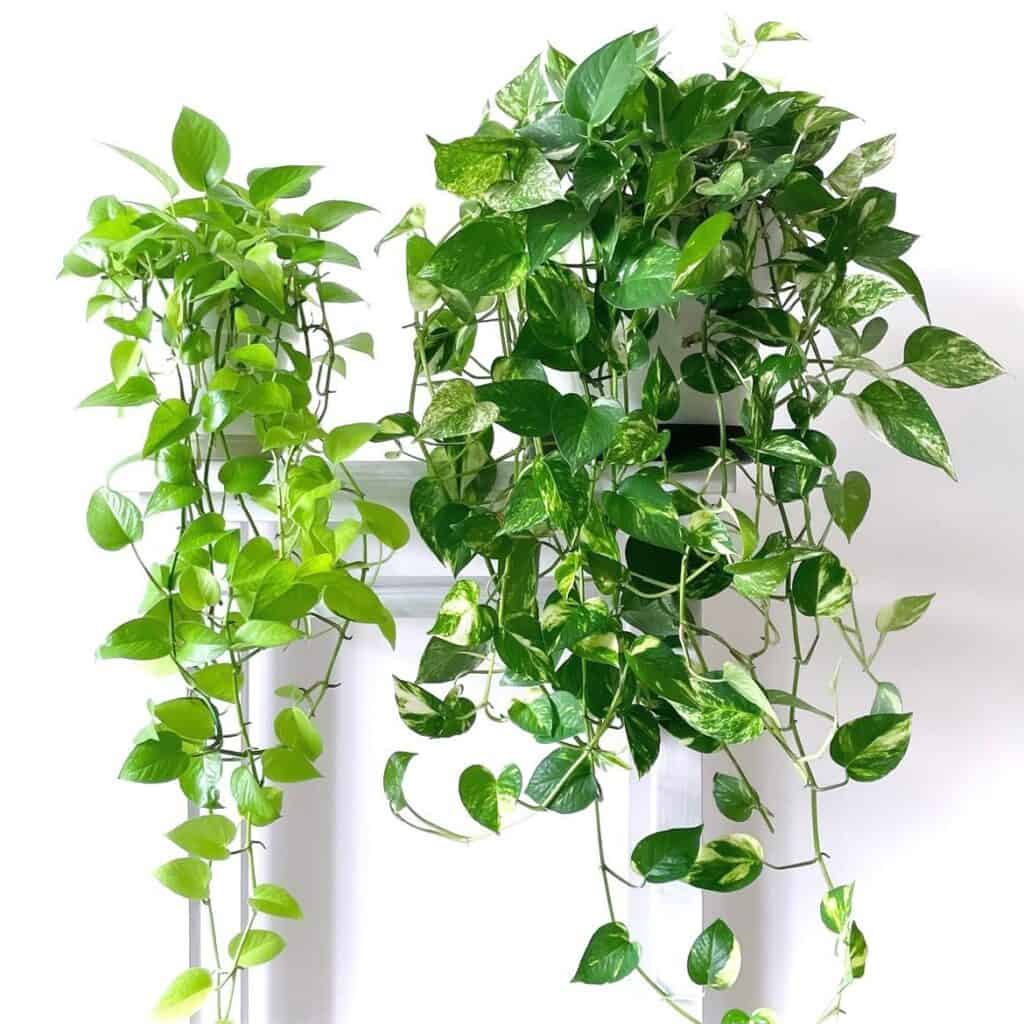
How To Incorporate Coffee Grounds Into Pothos Soil
The best way to incorporate coffee grounds into pothos soil is to mix them in with the existing soil. You can do this by adding a layer of coffee grounds on top of the soil and then mixing it in with a garden trowel. It’s important to make sure that the coffee grounds are spread evenly throughout the soil. You should also avoid adding too much coffee grounds, as this can make the soil overly acidic and can cause nutrient deficiencies.
Another way to incorporate coffee grounds into pothos soil is to use them as mulch. This method is particularly useful if you need to keep the soil moist. Simply spread a layer of coffee grounds on top of the soil and then add a layer of mulching material, such as wood chips or shredded bark. This will help to retain moisture and provide some additional nutrition to the plants.
Finally, you can also use coffee grounds as a fertilizer. This method is best used in combination with other fertilizers, as coffee grounds alone may not provide enough nutrients for your pothos plants. Simply sprinkle the coffee grounds around the plants and then add a balanced fertilizer. This will give your pothos the nutrition it needs to thrive.
Potential Risks Of Adding Coffee Grounds To Pothos Soil
Potting soil is an important part of growing healthy pothos plants, and adding coffee grounds to the soil can provide a number of benefits. However, there are some potential risks that gardeners should be aware of before adding coffee grounds to pothos soil.
The first potential risk is that coffee grounds can add too much nitrogen to the soil. Coffee grounds are high in nitrogen, and too much nitrogen can lead to plants growing excessively and developing excessively succulent leaves and shoots, which encourages sucking insects and mite outbreaks.
The second potential risk is that the coffee grounds may introduce fungal diseases to the soil. Coffee grounds can create an ideal environment for fungi to grow, which can be detrimental to the health of the pothos plants. If coffee grounds are added to the soil, the gardener should regularly check the plants for signs of fungal disease.
The third potential risk is that coffee grounds may create a too-acidic environment for the pothos plants. Coffee grounds are naturally acidic, so adding them to the soil may create an environment that is too acidic for the plant to thrive. To avoid this, the gardener should use a soil testing kit to measure the soil’s pH levels and adjust the amount of coffee grounds accordingly.
Overall, adding coffee grounds to pothos soil can be beneficial, but it is important to be aware of the potential risks and take steps to mitigate them. By regularly testing the soil, monitoring the plants for signs of disease, and adjusting the amount of coffee grounds added, gardeners can ensure that their pothos plants are growing in the best possible environment.
Different Types Of Coffee Grounds To Use For Pothos
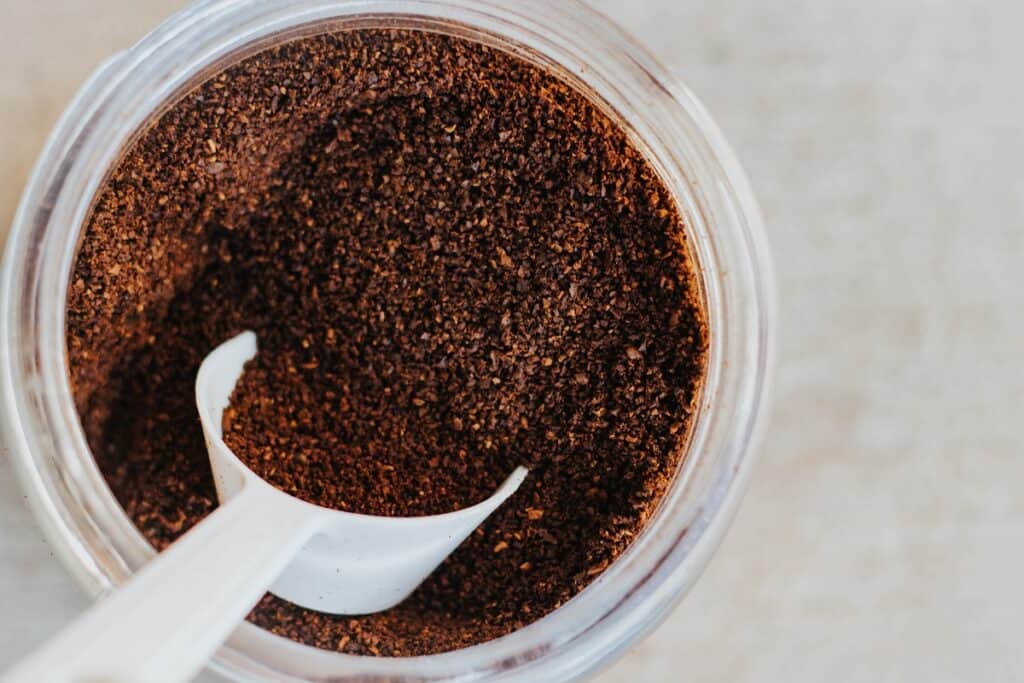
The type of coffee grounds that you can use for your pothos plants can vary depending on the desired outcome. Generally speaking, the best type of coffee grounds to use for pothos is grounds that have already been brewed. These grounds are often slightly acidic, which can help to improve the soil structure of your pothos plant’s medium. However, since they’ve already been used once, they may not have as many beneficial nutrients as fresh grounds.
Another type of coffee grounds that can be used for pothos plants is fresh, unbrewed grounds that are either from Arabica or Robusta beans. Arabica beans are known for their fruity, sweet, and floral notes while Robusta beans have more of a nutty and earthy flavor. Fresh, unbrewed grounds have more acid in them and are good to add to alkaline soil.
Grounds from espresso-style coffee makers can also be used for pothos plants. These grounds are much finer than those of regular drip coffee and contain more oils and acidity. Because of this, they can be beneficial for pothos plants in terms of creating a more nutrient-rich environment.
Finally, you can also use cold brew coffee grounds for pothos plants. Cold brew coffee grounds are known for having a more mellow flavor as well as a less acidic pH level. This makes them an ideal choice for pothos plants since they won’t be as acidic as other types of coffee grounds.
Maintenance Tips For Pothos Soil With Coffee Grounds
- Coffee grounds should be spread across the surface of the pothos soil and not buried deeply. Coffee grounds are a great source of nitrogen but can cause the soil to become too acidic if they are buried.
- Pothos thrive in soil that is moist but not soggy. If the soil is too wet, the roots could rot, so be sure to check the moisture levels regularly and water as needed.
- Pothos plants should be fertilized every few weeks with a balanced fertilizer. Coffee grounds can provide some of the nutrients, but additional fertilizer will help the plants grow stronger and healthier.
- To prevent mold and fungus growth, the soil should be kept clean and free of debris. Trim away dead or dying leaves and check the soil for any signs of disease or pests.
- Repotting should be done every few years to refresh the soil and provide the plant with more space to grow. When repotting, add some new soil and mix it in with the existing soil. This will help to keep the soil healthy and the plant thriving. Coffee grounds can be added to the new soil as well.
Recommended Amount Of Coffee Grounds For Pothos Soil
When using coffee grounds for pothos soil, it is important to use the correct amount to ensure that the plant is getting the best benefits from the nutrient-rich soil. Too much coffee grounds can make the soil too acidic, which can be harmful to the pothos’ delicate root system.
The recommended amount of coffee grounds for pothos soil is one to two tablespoons per gallon of soil. This amount of coffee grounds can help to create nutrient-rich soil for the pothos to thrive in. Additionally, the coffee grounds can help to keep the soil slightly acidic, which is beneficial for pothos plants.
When adding coffee grounds to the pothos soil, it is important to mix them in thoroughly with the soil. This will help to ensure that the coffee grounds are evenly distributed throughout the soil. Additionally, it is important to make sure that the coffee grounds are not clumped together as this can create an overly acidic soil environment, which can be harmful to the pothos.
Finally, it is important to remember that coffee grounds are not a substitute for regular soil fertilizer. It is important to still use regular fertilizer to ensure that the pothos is getting the proper nutrients from the soil. Coffee grounds can be a great supplement to the soil, but regular fertilizer is still necessary for optimal plant health.
How Often To Add Coffee Grounds To Pothos Soil?
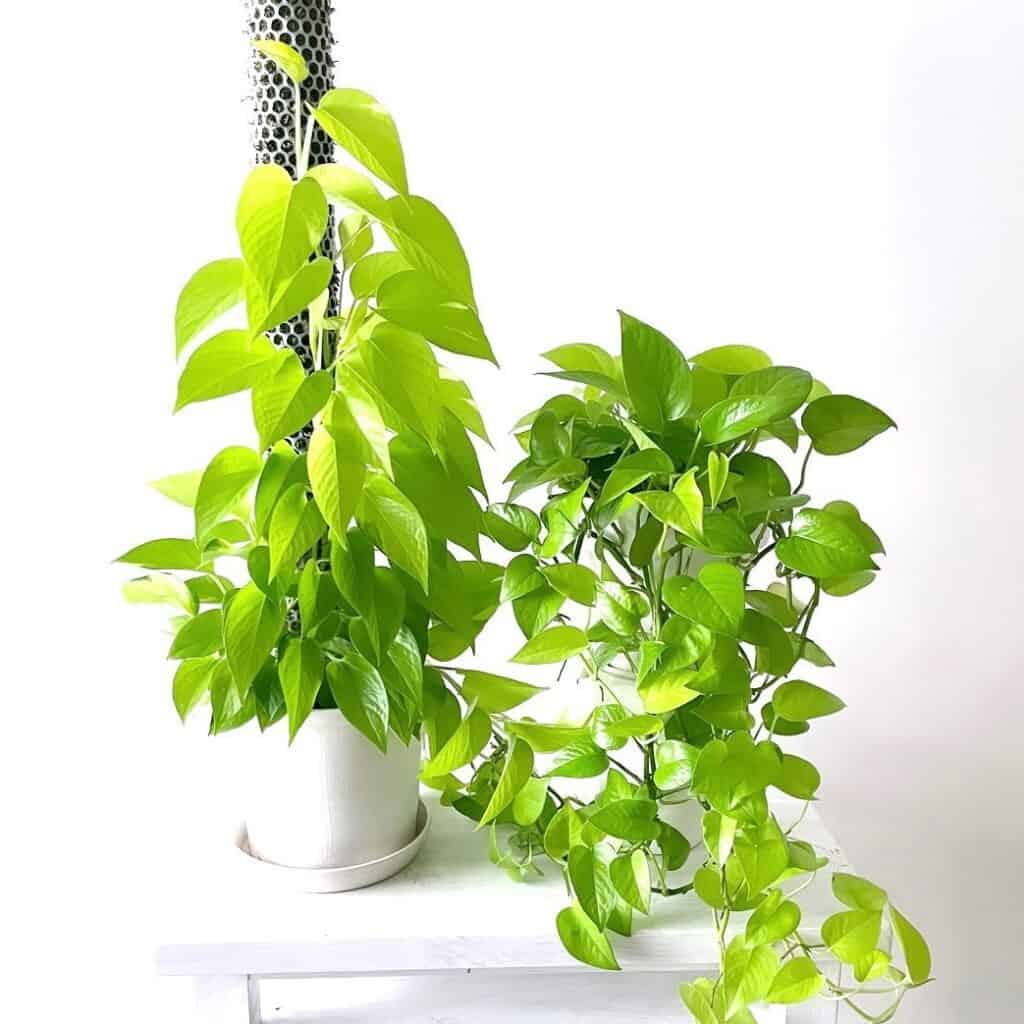
When it comes to adding coffee grounds to potting soil for pothos plants, it is important to consider how often you should be doing this. Generally speaking, it is recommended to add coffee grounds to potting soil for pothos plants no more than once a month. Too much coffee can cause the soil to become acidic, which can be harmful to your plants.
You should also consider the type of potting soil you are using. If you are using soil that is already high in nitrogen, you may not need to add any additional coffee grounds. If you are using soil with a lower nitrogen content, you may want to consider adding coffee grounds to give your plant the nutrients it needs.
When adding coffee grounds to potting soil, it is important to mix it well. You should also be sure to spread the grounds evenly over the soil. If you are using a larger pot, you may want to spread the grounds throughout the soil. This will ensure your pothos plants get the benefits from the coffee grounds.
Finally, it is important to remember that the amount of coffee grounds you add should be based on the size of your pothos plants. If your plants are small, you should add less coffee grounds, while larger plants may need more. This will help ensure your pothos plants get the right amount of nutrients and acidity.
Conclusion
In conclusion, it is safe to say that pothos may or may not like coffee grounds, depending on the individual. While coffee grounds may help to improve the soil quality, it is best to start with small amounts and observe the effects. If the pothos shows signs of distress, then it is best to not use coffee grounds in the soil. However, if it responds positively, then it can be a great addition to the soil. Ultimately, it is up to the individual grower to decide if they wish to use coffee grounds in their pothos plants.
